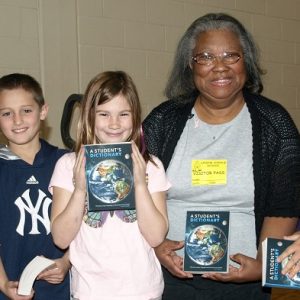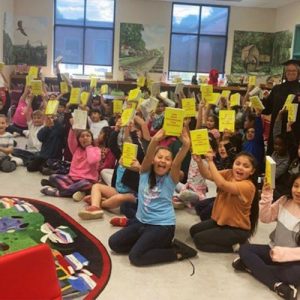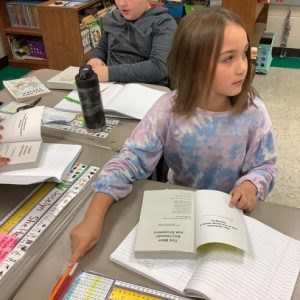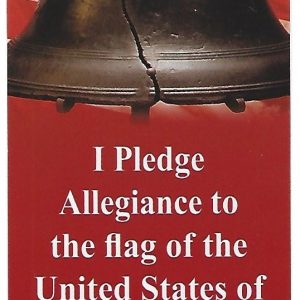The Dictionary Project: Elks give the gift of words
Nancy Mjelde, an active member of the Coeur d`Alene, Idaho, Lodge, has received hundreds and hundreds of thank-you letters from children over the past five years. But they`re not from her grandchildren—she has none. They aren`t from nieces or nephews, either. In fact, with rare exceptions, Mjelde doesn`t personally know the children who write the letters. But they know Mjelde, and they have just one reason for contacting her—to say thank you for the dictionaries she and her lodge have given them as part of their participation in The Dictionary Project.
Founded in South Carolina in 1995, the Dictionary Project is a national nonprofit organization which has the goal of providing every third-grade student in the United States with a dictionary. By doing this, the project hopes `to have a positive impact on education in this country and empower children to become skillful communicators and resourceful learners.` The Dictionary Project invites organizations and individuals all across the country to become sponsors of the project in their communities and, in exchange for specific donation fees, provides dictionaries for distribution to third graders in schools chosen by the sponsors.
The Dictionary Project focuses on third graders because most schools teach dictionary skills in the third grade, and children of this age are also just beginning to make the transition from learning to read to reading to learn. The Dictionary Project firmly believes that children need a dictionary to accomplish their schoolwork in a proper fashion and become effective users of the English language. As part of the bigger picture, the organization also believes that literacy is crucial to the economic success and prosperity of the country.
According to a recent study, 37 percent of American fourth graders have failed to achieve basic levels of reading proficiency, a frightening statistic considering the correlation between crime and unemployment levels and literacy rates. Given the urgency of the literacy problem in the United States, the Grand Lodge made The Dictionary Project a national initiative during the 2004-2005 lodge year, and the Grand Lodge Youth Activities Committee encourages every lodge to unite in the effort to provide a dictionary for every American third grader.
The benefits of participation in The Dictionary Project are numerous, and different lodges` involvement in it highlight different aspects of the project`s benefit not only to the students who receive dictionaries but also to the community and to participating lodges. Nancy Mjelde, who has been the Coeur d`Alene, Idaho, Lodge Dictionary Committee chairman for the past five years, for instance, believes that the cooperation and fellowship of other Elks is one of the most gratifying aspects of her involvement in the project. According to Mjelde, The Dictionary Project has become a very popular activity among Coeur d`Alene Lodge members. `I give a report on the lodge floor regularly— not every month, but several times a year when we`ve made significant progress,` Mjelde says. `I`ve never heard anybody in our lodge say one word against it.` The Dictionary Project is so popular, in fact, that the lodge doesn`t even have to do special fund-raising for it anymore. `We used to do fund-raising,` Mjelde says, `but now we have funds for it as a line item in our budget.` And when it comes to loading, transporting, and distributing the dictionaries, there is no shortage of lodge members to help. `Last November,` Mjelde recalls, `we had seven Elks load the books into four vehicles. We had a caravan to the schools.`
For Brattleboro, Vermont, Lodge PER Earl Cavanagh, who is a member of his lodge`s Youth Activities Committee, The Dictionary Project represents an important community service project. `It opens doors into the schools of the community, paving the way for other Elks youth projects,` Cavanagh says. His lodge, a medium-size lodge, recently supplied dictionaries to all the third graders in three local school districts, and he reminds other lodges that an ENF Gratitude Grant is a good way to buy dictionaries for the project. `If your lodge meets its annual per capita for the Elks National Foundation,` Cavanagh says, `you`re eligible for a grant of up to $500, and you can use that to pay for the dictionaries.`
Duarte, California, Lodge members also are well aware of the usefulness of the Elks National Foundation as a source of funding for The Dictionary Project. With fewer than 200 members, the Duarte Lodge doesn`t hesitate to make full use of resources from the Elks National Foundation as it tries to help schools in its area that are facing financial difficulties. Using ENF funds, the Duarte Lodge obtains several hundred dictionaries annually and distributes them to students in public and private schools in Duarte and nearby Monrovia.
`We have so many unemployed people here,` says lodge member Larry Van Den Bossche. `The aircraft industry left. The schools don`t have the money to buy dictionaries for each third grader, so the children are very appreciative of our gifts. We have tons of thank-you letters. All of our active members know about this project, and a lot of the children who receive the books are the grandchildren and great-grandchildren of our members.`
With such close ties to the local school system, Duarte Lodge members have a thorough understanding of the needs of the students in their area. Many of the students speak Spanish, so Duarte Lodge members allowed this knowledge to guide them in their decision to choose an English-to-Spanish, Spanish-to-English dictionary for distribution.
The John H. Kinzie Elementary School in Chicago, which was brought into The Dictionary Project and sponsored by the Oak Lawn, Illinois, Lodge, is strikingly similar to the schools in the Duarte Lodge`s area. Many of the Kinzie Elementary School`s 750 students, including its approximately eighty-five third graders, are from bilingual families (Polish and Spanish speaking), and almost half are from low-income homes. With little money available for third-grade dictionaries, the school was very enthusiastic about receiving complimentary dictionaries when it was approached by Tina Haran, who has the distinction of being the mother of eight-year-old Jack, a third grader at Kinzie Elementary School, a member of the Oak Lawn, Illinois, Lodge, and the director of the Grand Lodge Convention Department.
Haran first learned about The Dictionary Project when she saw an exhibit about it at the 2009 Elks Grand Lodge Session in Portland, Oregon. When she suggested to her fellow lodge members that the Oak Lawn Lodge become involved in The Dictionary Project, they were enthusiastic about the idea. Haran then contacted the Parent-Teacher Committee and the principal at the Kinzie Elementary School to get their permission to go ahead with the project. Once she had obtained the approval of parents and school officials, she ordered a sample dictionary kit from The Dictionary Project, and when the books arrived, she began the process of selecting one from among them to distribute to Kinzie Elementary School third graders.
`All lodges do it differently,` Haran says of the dictionary selection process, noting that some lodges allow school officials to select a dictionary from the kit for distribution to their students. Haran, however, decided to allow a future user of the dictionary to decide which one to get and ordered the dictionary that her son, Jack, liked best. Then, with the assistance of fellow Oak Lawn Lodge members, the school`s principal, Dr. Sean Egan, and several of Kinzie Elementary School`s third-grade teachers, Haran planned the presentation ceremony.
`We visited the school in November,` Haran recalls, `and our visit was a surprise to the children. I introduced the Elks from the lodge who were with me and told the class a little bit about the Elks. Then we presented a dictionary to each child, along with an adhesive bookplate and a bookmark bearing some inspirational words about reading and learning, and brief information about the Elks.
`As a group exercise, each student wrote his or her name on the adhesive book plate and then tried to locate the five longest words in the dictionary. At the end of the presentation at least one youngster in every class asked: `Do we get to keep these or do we have to turn them in at the end of the year?`
`When the students later wrote thank-you letters to the lodge, several of them commented on things they had noticed in their dictionaries specifically, pictures of planets and a sign language alphabet that Dr. Egan showed them.`
Laura McDonough, one of Kinzie Elementary School`s third-grade teachers, assured her twenty-seven students that the dictionaries were theirs to keep permanently. `My students were so excited about having their own dictionaries,` she says. `They really took ownership of them and started to look up words right away. Before the dictionaries were presented, we had only ten dictionaries in our class. There weren`t even enough to allow the students to work with dictionaries in pairs, so having the personal dictionaries has given them a tremendous boost in their writing and researching skills. . . . We really appreciate the generosity of the Elks.`
Twin sisters Catherine and Ann Marie are students in McDonough`s class. Their mother, Diane, encourages the girls to use their dictionaries, which she says they both enjoy very much. `I tell them to pick a new word every day,` Diane says, `look it up, and use it. Then they will often ask me if I can spell a certain word.`
To date, Elks nationwide have donated more than 1.2 million dictionaries to third-grade students and their teachers as sponsors of The Dictionary Project.
Otto Sayles, chairman of the Grand Lodge Youth Activities Committee and Grandview-Hickman Mills, Missouri, Lodge PER, is a former middle school Spanish and physical education teacher and knows from experience how vital a comprehensive vocabulary is to a student`s academic achievement. `When a student didn`t have access to a dictionary, or didn`t have the motivation to find one, his choice of words in written papers seemed very limited to me,` he says. `Getting involved in The Dictionary Project is a great goal for our lodges.`
Through The Dictionary Project, your lodge, too, can become the proud sponsor of schools in your area. Hold a fund-raiser, apply for a $500 ENF Gratitude Grant, and put a line item in your lodge`s budget. With dictionaries from The Dictionary Project costing as little as $1.25 each, it won`t take very much to make a huge difference in the educational lives of third graders in your area. Visit www.dictionaryproject.org for more information, and get your lodge started on the road to sponsorship today.
Reasons to Get Involved
`Our country and our world face many challenges, and we need to prepare our young people to be strong, productive citizens who can succeed and grow and solve problems in a rapidly changing world. A dictionary may be a small thing, but it is a powerful tool to help with learning, and when it is a gift from a child`s community, the child learns from it not just the value of schoolwork, but also the example of community service. Our sponsors have made tireless efforts to improve literacy and the quality of life in their communities. These volunteers are the breath of life of The Dictionary Project. Through The Dictionary Project, people feel empowered to effect change and improve education so that the children will grow up better prepared to compete in the global economy.` –The Dictionary Project
Becoming a Sponsor
If the members of your lodge would like to sponsor The Dictionary Project in your area, several easy steps should be taken. First, go to The Dictionary Project website (http://www.dictionaryproject.org/) to learn as much as possible about the project. Next, identify the schools in your area where the dictionaries would be given. Then, contact the schools` administrators and teachers and gain their permission to conduct the program in their schools. Also, write a letter to all the parents of all the students who would be involved, explaining The Dictionary Project and what your lodge wants to do. The Dictionary Project website offers a number of sample letters, including letters to superintendents, principals, and parents, which lodge members can use as templates. After school administrators, teachers, and parents have granted the necessary permission, the number of dictionaries needed for each school should be determined. Once the number of dictionaries needed is known, the dictionary selection and ordering process can begin.
The Dictionary Project offers nine different dictionaries (including three bilingual dictionaries and a Canadian edition dictionary) and eight reference books from which to choose. (Reference books include thesauruses, a dictionary and thesaurus usage guide, an atlas, and a vocabulary builder.) The books range in price from $1.25 to $3.95 each (shipping is included in the price), and a sample kit containing five dictionaries can be purchased for $15 to help lodge members select the dictionary they feel is best for each school the lodge sponsors. After lodge members have chosen the dictionaries they want to distribute, they can place an order for the books by visiting The Dictionary Project website or by calling 843-388-8375 or 843-856-2706. Books generally arrive within two weeks, and once they are available, school officials can be contacted to arrange a presentation ceremony date and time.
The presentation ceremony and distribution of the books to the children is an exciting and memorable experience for everyone involved—lodge members and teachers, but especially the children. And, a lodge that gives the gift of words will be giving a gift that will keep on giving throughout a recipient`s entire life. A dictionary is a gift that students will remember and use and with which they will have a better chance of succeeding in school and in life.
Sample Kits
Two different sample kits are available from The Dictionary Project to help your lodge choose the dictionaries and reference books it wants to give to students in schools in the area. Each sample kit contains five books and can be obtained for $15. Sample kit one contains all five of the American English language dictionaries The Dictionary Project offers, while sample kit two contains a dictionary and thesaurus usage guide; a Spanish-to-English dictionary; an English-to-Spanish and Spanish-to-English dictionary; an atlas; and a thesaurus. To order either sample kit, simply visit The Dictionary Project online at http://www.dictionaryproject.org/dictionaryproject.org/ or call 843-388-8375 or 843-856-2706.




